|
|
|
Sort Order |
|
|
|
Items / Page
|
|
|
|
|
|
|
| Srl | Item |
| 1 |
ID:
102398
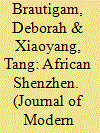

|
|
|
|
|
| Publication |
2011.
|
| Summary/Abstract |
This article examines recent Chinese efforts to construct a series of official economic cooperation zones in Africa. These zones are a central platform in China's announced strategy of engagement in Africa as 'mutual benefit'. We analyse the background, motives and implementation of the zones, and argue that they form a unique, experimental model of development cooperation in Africa: market-based decisions and investment by Chinese companies are combined with support and subsidies from an Asian 'developmental state'. Though this cooperation provides a promising new approach to sustainable industrialisation, we also identify serious political, economic and social challenges. Inadequate local learning and local participation could affect the ability of the zones to catalyse African industrialisation. The synergy between Chinese enterprises, the Chinese government and African governments has been evolving through practice. A case study of Egypt provides insight into this learning process.
|
|
|
|
|
|
|
|
|
|
|
|
|
|
|
|
| 2 |
ID:
115829


|
|
|
|
|
| Publication |
2012.
|
| Summary/Abstract |
FOREIGN INTEREST IN LARGE LAND ACQUISITIONS IN AFRICA began to hit the headlines in 2007 and 2008. China, a net food importer since 2004, was seen as one of the chief players in this rush for land. Mozambique has often been cited in support of the widespread conclusion that the Chinese government is directly seeking land in Africa for China's own food security.1 This briefing shows that the much-circulated picture of Chinese agricultural activities in Mozambique is closer to fiction than fact. That the conventional wisdom on Mozambique can be so far from reality calls into question the picture in other African countries as well.
Worries about the developmental impact of large-scale land investment are well-founded. Large land transfers are bound to raise alarms, and more so if the land is communally owned or occupied by subsistence farmers, or in a food-deficit region. Furthermore, many believe that Chinese companies will not simply invest in a search for profit, but will act primarily to advance Beijing's national security goals.2 Chinese foreign investment in land evokes fears of loss of national control, hence the parallels that are frequently drawn with neo-colonialism.
|
|
|
|
|
|
|
|
|
|
|
|
|
|
|
|
| 3 |
ID:
186995
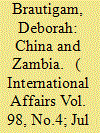

|
|
|
|
|
| Summary/Abstract |
Does Zambia's exceptionally high level of Chinese loan commitments provide insights into China's financial statecraft? Some have argued that Chinese lending to Zambia reflects China's purposeful use of loans to build leverage and perhaps acquire strategic assets. This article uses new data on Chinese loans, lenders and contractors and process-tracing to argue instead that Zambia is an extreme case of coordination problems in Chinese lending. Among all African countries with Chinese loans, Zambia has had the largest number of distinct Chinese lenders since 2000 (18) and the second largest number of different Chinese contractors winning Chinese loan-financed projects (29). This multiplication of stakeholders has created fierce and unregulated competition for infrastructure contracts in Zambia. In Beijing, ‘fragmented authoritarianism’ has meant an absence of top-down coordination of firms' and lenders' activities and thus few restraints. At the same time, Zambia's political leaders disregarded their own restraints on over-borrowing. Distinctive Chinese ideas about debt sustainability likely created additional disincentives for close Chinese monitoring. Finally, Zambia's history of frequent debt cancellations from China and other lenders likely exacerbated moral hazard risks.
|
|
|
|
|
|
|
|
|
|
|
|
|
|
|
|
| 4 |
ID:
048555
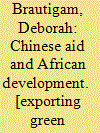

|
|
|
|
|
| Publication |
London, macmillan Press, 1998.
|
| Description |
xiii, 268p.
|
| Standard Number |
0333712803
|
|
|
|
|
|
|
|
|
|
|
|
Copies: C:1/I:0,R:0,Q:0
Circulation
| Accession# | Call# | Current Location | Status | Policy | Location |
| 040238 | 338.915106/BRA 040238 | Main | On Shelf | General | |
|
|
|
|
| 5 |
ID:
113287
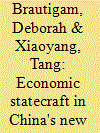

|
|
|
|
|
| Publication |
2012.
|
| Summary/Abstract |
China's rapidly growing economic engagement with other developing countries has aroused intense debates, but these debates have often generated more heat than light. The Chinese government is clearly pushing its companies to move offshore in greater numbers, and state-owned firms figure prominently in many of the major investments abroad. Yet relatively little research exists on when, how and why the Chinese government intervenes in the overseas economic activities of its firms. China's state-sponsored economic diplomacy in other developing countries could play three major strategic roles: strengthening resource security, enhancing political relationships and soft power, and boosting commercial opportunities for national firms. This article examines China's programme to establish overseas special economic zones as one tool of Beijing's economic statecraft. It traces the process by which they were established and implemented, and investigates the characteristics of the 19 zones initially selected in a competitive tender process. The article concludes that even in countries rich in natural resources, the overseas zones were overwhelmingly positioned as commercial projects. Particularly in the Asian zones, China is following in the footsteps of Japan. The zone programme, and the Chinese foreign investment it hoped to foster, represents a clear case of the international projection of China's developmental state. However, in Africa (but not generally elsewhere) discourse surrounding the zones publicly positions them as a transfer of China's own development success, thus potentially enhancing China's political relationships and soft power on the continent.
|
|
|
|
|
|
|
|
|
|
|
|
|
|
|
|
| 6 |
ID:
161814
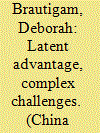

|
|
|
|
|
| Summary/Abstract |
Industrial policy is back on the African policy agenda, with a number of countries following new strategies for rapid industrialization. None have done so more eagerly than Ethiopia. The present paper draws on Justin Yifu Lin's framework of New Structural Economics to assess Ethiopia's industrial policies and engagement in the leather industry. Making use of two rounds of semi-structured interviews (2012 and 2015) with all of the foreign firms and more than a dozen local firms in the leather sector, as well as other key stakeholders, it examines seven steps the government took to build the industrial policy: Create a high-level focus on the sector; make strategic use of international development partners; attract a “lead goose” (Chinese) in the footwear sector; build government capacity to support the sector; strengthen business associations; “shock-to-shape” upgrading; improve input supply. Ultimately, while government interventions have led to improvements across several steps of the value chain, the paper identifies a number of factors that have prevented the country from fully realizing a latent comparative advantage in the leather sector.
|
|
|
|
|
|
|
|
|
|
|
|
|
|
|
|
|
|
|
|
|